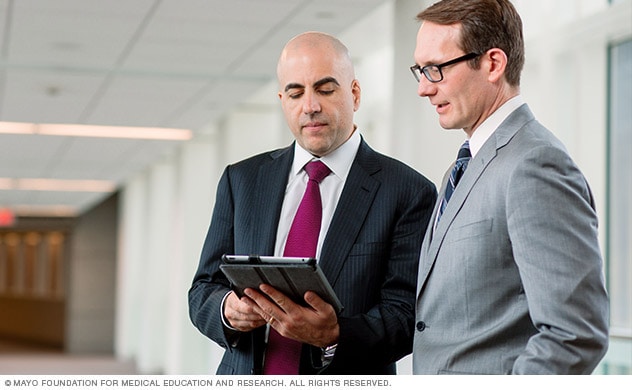Brain AVM care at Mayo Clinic
Your Mayo Clinic care team
At Mayo Clinic, neurologists, neurosurgeons, neuroradiologists and other specialists work together as a multidisciplinary team to provide expert, individualized care to every person with a brain AVM. This means that you're not just getting one opinion — you benefit from the knowledge and experience of each specialist.
Close collaboration enables the team to have your test results available quickly and to coordinate all necessary appointments. Evaluation and treatment that might take weeks elsewhere can typically be done in only a matter of days at Mayo Clinic.
Your Mayo Clinic care team takes the time to explain and discuss all your treatment options. The team develops a whole-person treatment plan based on the location and size of the AVM, your risk of complications and your overall health.
 Stereotactic radiosurgery for AVM teamwork at Mayo Clinic
Stereotactic radiosurgery for AVM teamwork at Mayo Clinic
Advanced diagnosis and treatment
An accurate diagnosis is critical for making appropriate treatment decisions. Specialists who are skilled and experienced in all AVM treatment options are the key to successful treatment outcomes.
At Mayo Clinic, your AVM care team have the experience and knowledge to make accurate diagnoses and recommend the right treatment plan for you.
People with brain AVMs at Mayo Clinic experience:
- A tailored exam. Mayo Clinic specialists perform a thorough exam of each person that is tailored to the person's specific symptoms and condition. This results in a more accurate diagnosis compared with a typical neurological exam.
- Advanced imaging studies. MRI and other types of brain imaging are crucial to effective treatment. Mayo Clinic neuroradiologists devote their careers to evaluating brain conditions. This deep experience results in more-accurate imaging and interpretation.
- Expert treatment. Mayo Clinic neurosurgeons have pioneered surgical techniques as well as noninvasive stereotactic radiosurgery for brain AVM. With this expertise in surgery and noninvasive treatment as well as in embolization and watchful waiting, the AVM team at Mayo Clinic provides people the widest range of treatment options available.
With state-of-the-art research and laboratory facilities, Mayo Clinic experts are constantly seeking new medical knowledge and innovations for people with AVMs. Today's research teams are studying potential treatments, including new surgical options, innovations in imaging technology and better ways to predict risk of hemorrhage in people with AVMs. A variety of clinical trials and other clinical studies may be available to you at Mayo Clinic.
Nationally recognized expertise
Mayo Clinic specialists have extensive expertise and experience in treating brain arteriovenous malformations and other brain and nervous system conditions (neurological conditions). They evaluate and treat more around 700 people with brain AVMs and other vascular conditions affecting the brain each year.
Expertise and rankings
Each year, Mayo Clinic experts provide comprehensive care for around 700 people with brain AVMs and other vascular conditions affecting the brain.
-
Teamwork. At Mayo Clinic, neurologists, neurosurgeons, neuroradiologists and other specialists work together as a multidisciplinary team to provide expert, individualized care to every person with a brain AVM. You benefit from the knowledge and experience of each specialist.
Close collaboration enables the team to have your test results available quickly and to coordinate all necessary appointments.
- Diagnostic tools. MRIs and other types of brain imaging are crucial to effective treatment. Mayo Clinic neuroradiologists devote their careers to evaluating brain conditions. This deep experience results in more-accurate imaging and interpretation.
- The latest techniques and technology. Mayo Clinic neurosurgeons have pioneered surgical techniques as well as noninvasive stereotactic radiosurgery for AVM. With this expertise in surgery and noninvasive treatment as well as in embolization and watchful waiting, the AVM team at Mayo Clinic provides people the widest range of treatment options available.
- Nationally recognized expertise. Mayo Clinic's neurology and neurosurgery program has earned a national reputation as a top treatment center. The program is recognized for its multidisciplinary approach to diagnosis, treatment and patient care as well as for its advanced research into improved treatments.
Mayo Clinic in Rochester, Minnesota, Mayo Clinic in Phoenix/Scottsdale, Arizona, and Mayo Clinic in Jacksonville, Florida, rank among the Best Hospitals for neurology and neurosurgery in the U.S. News & World Report Best Hospitals rankings. Mayo Clinic Children's in Rochester is ranked the No. 1 hospital in Minnesota and the five-state region of Iowa, Minnesota, North Dakota, South Dakota and Wisconsin, according to U.S. News & World Report's 2025-2026 "Best Children's Hospitals" rankings.
Learn more about Mayo Clinic's neurology and neurosurgery departments' expertise and rankings.
Mayo Clinic Children's
Highly skilled pediatric experts diagnose and treat all types of conditions in children. As a team, we work together to find answers, set goals and develop a treatment plan tailored to your child's needs.
Learn more about Mayo Clinic Children's.
Locations, travel and lodging
Mayo Clinic has major campuses in Phoenix and Scottsdale, Arizona; Jacksonville, Florida; and Rochester, Minnesota. The Mayo Clinic Health System has dozens of locations in several states.
For more information on visiting Mayo Clinic, choose your location below:
Costs and insurance
Mayo Clinic works with hundreds of insurance companies and is an in-network provider for millions of people.
In most cases, Mayo Clinic doesn't require a physician referral. Some insurers require referrals or may have additional requirements for certain medical care. All appointments are prioritized on the basis of medical need.
Learn more about appointments at Mayo Clinic.
Please contact your insurance company to verify medical coverage and to obtain any needed authorization prior to your visit. Often, your insurer's customer service number is printed on the back of your insurance card.